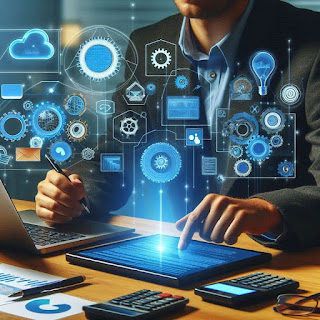🔗 ERP: The Smart Core of Every Successful Business
In today’s fast-paced business world 🌍, efficiency, integration, and real-time insights are no longer optional — they’re essential. Enter ERP (Enterprise Resource Planning) — a powerful software system that connects every function of your organization into a unified digital hub 🧠. Whether it’s tracking sales, managing inventory, or processing payroll, ERP does it all — intelligently and seamlessly 🛠️.
🧩 What Is ERP?
ERP is an all-in-one software platform that centralizes and manages core business functions such as:
-
📦 Inventory
-
💵 Finance & Accounting
-
👥 Human Resources
-
📊 Sales & CRM
-
🚚 Supply Chain
-
🏭 Manufacturing
Instead of using separate systems for each department, ERP integrates everything into a single source of truth 🔍 — boosting accuracy, speed, and collaboration 🤝.
💡 Why ERP Matters
-
Improved Productivity ⚙️
ERP automates repetitive tasks like billing 🧾, report generation, and order tracking — reducing errors ❌ and saving valuable time ⏱️. -
Real-Time Data Access 📈
Business leaders can access live dashboards and analytics 📊 to make fast, informed decisions and monitor performance. -
Cost Savings 💸
By streamlining workflows and improving resource allocation, ERP systems help reduce operational costs significantly 📉. -
Scalability 📈
ERP systems grow with your business. You can start small and add modules as your needs evolve 📦➕. -
Customer Satisfaction 😊
With integrated CRM, order tracking, and service modules, customers receive faster responses and better service 💬.
☁️ Cloud ERP: The Future Is Now
Modern ERP solutions are cloud-based ☁️, which means:
-
📲 Access from anywhere, anytime
-
🔁 Automatic updates and backups
-
🔐 Enhanced data security
-
💻 Remote team collaboration
Cloud ERP ensures agility for businesses in a mobile, hybrid work environment 🌐.
🛠️ Key ERP Modules
-
Finance 💰: Manages budgets, expenses, and reporting.
-
HR 👨💼: Tracks employee data, payroll, and benefits.
-
Inventory 📦: Monitors stock levels and movements.
-
CRM 🤝: Manages customer data and interactions.
-
Procurement 🛒: Handles purchasing and vendor management.
-
Production 🏗️: Oversees manufacturing and operations.
Each module can work alone or together, creating a flexible system tailored to your business needs 🧩.
⚠️ ERP Challenges
Implementing ERP comes with hurdles, such as:
-
High Initial Investment 💳
-
Employee Resistance 🙅♂️
-
Training Requirements 🧑🏫
-
Implementation Time ⌛
But with proper planning and support, these challenges are manageable and well worth the effort ✔️.
🔮 What’s Next?
The future of ERP lies in AI 🤖, IoT 🌐, and predictive analytics 🔍. Intelligent ERP systems will automatically flag issues, optimize processes, and suggest improvements — turning data into action faster than ever 🚀.
✅ Conclusion
ERP is more than just software — it’s a strategic asset that drives growth, efficiency, and innovation 💼✨. Businesses that adopt ERP gain a competitive edge through smart automation, deep insights, and seamless collaboration. The time to embrace ERP is now — and the future belongs to the integrated 🌟.
For more insights visit quantazone.




Comments
Post a Comment